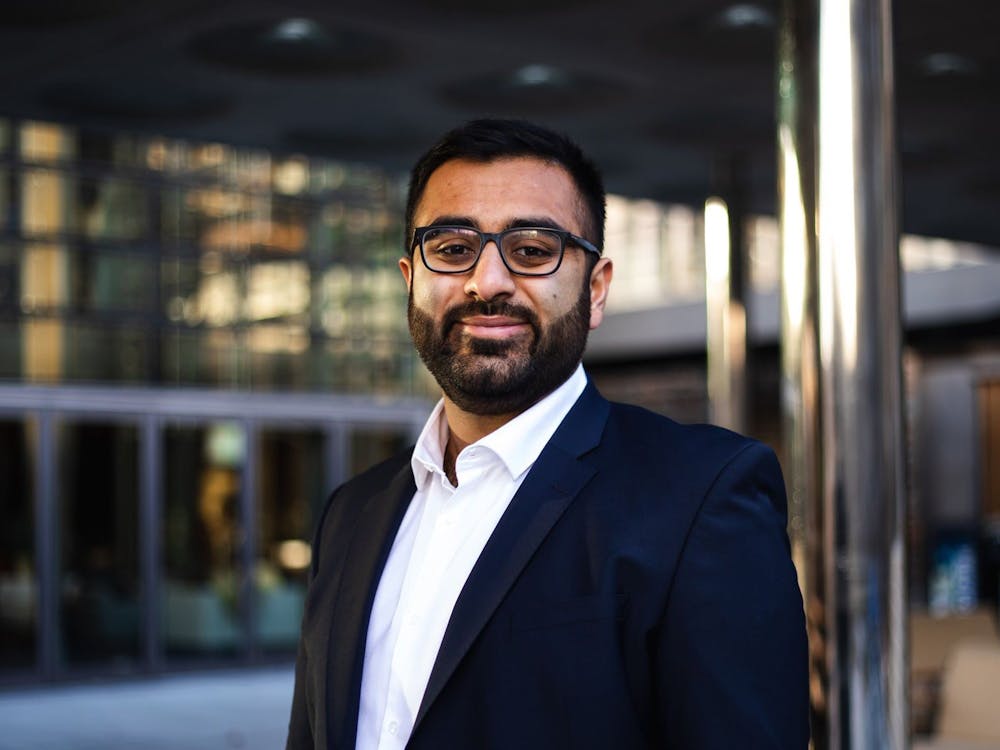Young Trustee finalist Ibrahim Butt, a senior, seeks to empower marginalized voices, a mission that he has sustained from his high school involvement in the United Kingdom to his years at Duke.
If elected, Butt would work to “ensure that any decision [the Board of Trustees] make, they think about the human cost of their actions,” he said.
Butt’s background as a low-income, first-generation student has galvanized and guided his campus involvement.
“If you want to know who I am at Duke, you really have to know who I was before I came to Duke,” he said.
He grew up in Blackburn—which he described as “a small town in northern England that no one has ever heard about”—as the child of immigrant parents in an immigrant community grappling with economic inequality and stagnation.
When Butt first arrived at Duke as a low-income, first-generation student, few resources existed to support students like him, he said, which meant that he often felt out of place in a “very elitist institution.”
But he wasted no time in harnessing this unease and channeling it into an effort to empower students at Duke from underprivileged backgrounds. Butt helped spearhead Duke Low-Income, First-generation Engagement, an organization that advocates for low-income and first-generation students. As co-president of Duke LIFE, he has focused on “uplifting marginalized voices,” a vision he said he would continue to carry forward if elected to the Board of Trustees.
Last year, Butt helped organize the inaugural Duke LIFE conference to empower students from across the southern United States.
He said he had decided to take on leadership of Duke LIFE after the Board of Trustees had attempted to reduce student health care, which would have disproportionately hurt low-income students.
“[The decisions] the Board of Trustees make regarding financial aid impact me directly,” Butt said. “They impact my family, they impact my friends and they impact my very existence at this University. So I understand how important the Board is and that’s why I want to be a member of it—to ensure that the conversations we’re having and the decisions we’re making are equitable and accessible for all students.”
On campus, he also serves as an executive member of the student-led Center for Race Relations.
“Duke, for me, is not just about being a student,” Butt said. “It's about being a leader, trying to be a changemaker and really trying to make my education a force for good. And I've really tried to do that in the communities and experiences I've been invested in.”
Butt works as an advocate for the Community Empowerment Fund, an organization that aims to expand economic opportunities for individuals in Durham. Through involvement in the CEF, he has supported more than twenty individuals in their search for employment, housing and healthcare.
“Duke becomes a better university if Durham becomes a more equitable and forward thinking city,” he said.
Given his personal identity and experience working with marginalized groups, Butt believes he would bring a unique perspective and a commitment to advocacy to the Board of Trustees. He aims to act as a fiduciary of the University by promoting internal and external development, a vision that parallels the two-pronged nature of his service: further investment in students and greater engagement with Durham.
Butt emphasized that his involvement at Duke has not just been about “big leadership roles” but also about “building community on a day to day basis.” He served as House Council President of his first-year residence hall and as sophomore class president.
Senior Erin McDermott’s friendship with Butt began two years before arriving at Duke through their shared involvement in the Sutton Trust U.S. Programme, a program run by the Fulbright Commission to enable low-income students to access higher education in the U.S.
“He cares about pushing what makes Duke a community, what makes Duke a home, pushing it forward,” McDermott said. “He’s the kind of person that, whenever anyone would need him to be there or would need help, he will drop everything and be that person.”
McDermott described how Butt was instrumental in supporting her during a difficult first year, when she contemplated transferring out of Duke.
“When I needed someone to be there and to convince me that Duke was worth staying, it was him,” she said.
Abdullah Antepli, associate professor of the practice of interfaith relations in the Divinity School, described Butt as a responsible and ethical ambassador, who understands how to advocate for specific communities while also transcending personal convictions to “represent a broad spectrum of people.”
“That’s what you want,” Antepli said. “You send these Young Trustees to be the representative face and voice of the student body.”
Antepli believes that, as a Young Trustee, Butt would effectively balance the need for compromise with the drive for change, resisting the temptation to be a “doormat” for the Board’s decisions while remaining flexible in his pursuit of the “greater good of society.”
“He has this burning fire in him,” Antepli said. “He understands the world through the lens of social justice ... that’s the goodness of this man who is keenly aware of his privileges, and he is so committed to turn his privileges into some sort of service, some sort of commitment.”
Editor's Note: This article has been corrected to reflect that Butt has supported more than twenty individuals with CEF, not fifty. The Chronicle regrets the error.
Get The Chronicle straight to your inbox
Signup for our weekly newsletter. Cancel at any time.

Chris Kuo is a Trinity senior and a staff reporter for The Chronicle's 118th volume. He was previously enterprise editor for Volume 117.

